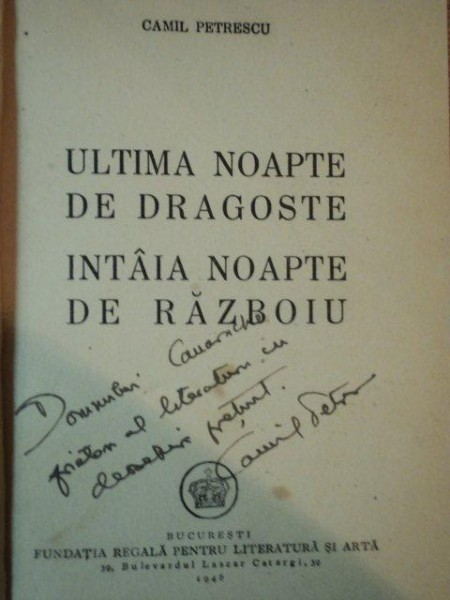The last night of love, the first night of war by Camil Petrescu
original title: Ultima noapte de dragoste, întâia noapte de războiu


Camil Petrescu is the writer who profoundly transformed the Romanian novel, in the sense of overcoming traditionalism and its synchronization with the issues, turmoil, sensitivity of the modern era.
In terms of style, like Liviu Rebreanu, Camil Petrescu declares himself a follower of the anti-calophilic style.
"The last night of love, the first night of war", by Camil Petrescu, published in 1930, is a modern novel, psychological, subjective, which has as characteristics: the uniqueness of the narrative perspective, the present and subjective time, the relationship between chronological time and psychological time, affective memory (involuntary), narration in the first person, lucidity of (self) analysis, anticalofism, but also the authenticity of living. The theme of the novel is love and war as fundamental experiences of knowledge lived by the protagonist.
The main character, Ștefan Gheorghidiu, is the type of lucid intellectual, in search of fundamental experiences and who aspires to an absolute love, love meaning for him a form of knowledge. Feelings are constructed through inner monologue and introspection.
The novel is built in two parts, corresponding to the two experiences. The experience of love is updated by recollection, while that of war is recorded in the form of a front diary.
In the beginning, the spatio-temporal coordinates are fixed with realistic precision: "In the spring of 1916, as a fresh lieutenant, first concentrated, I took part, with an infantry regiment from the capital, in the fortification of Prahova Valley, between Busteni and Predeal". Instead, the open ending leaves room for multiple interpretations, as is generally the case in the prose of psychological analysis.
Unlike traditional novels, in which the conflict is external, in Camil Petrescu's novel appears the internal conflict, from the consciousness of the narrator, Ștefan Gheorghidiu, who lives contradictory states and feelings towards his wife, Ela. This inner conflict is generated by the protagonist's relationships with the surrounding reality.
The title, a broad nominal lexical structure, based on a repetitive syntactic parallelism, reveals the bipolar composition and captures the two experiences of the protagonist. The symbol of the night is the uncertainty that devours him inwardly, the irrational. The two adjectives from ordinal numerals, placed in a significant order, "last" and "first" suggest the hero's willingness to overcome the drama of deceived love and to enter other horizons of knowledge.
Ștefan Gheorghidiu is a brilliant student of philosophy, without material means; in college he falls in love with her. Initially, he put his love under the sign of pride ("pride was the basis of my future love"), benefiting from everyone's admiration. The situation changes when Gheorghidiu receives an unexpected inheritance from an uncle (a first defining sequence for the theme); from now on, the two will lead a modern life; While Stefan is not interested in this aspect, she discovers ways to show off her charm, which leads to changes in the couple.
Another of Stefan's uncles, Nae, proposes to them to buy a metallurgical enterprise, which leads to a new discrepancy between the two: while he was repulsed by this type of activity, she was attracted by the offer. Moreover, she is delighted with the proposal to seduce an important businessman. Stefan is disturbed by his wife's involvement in inheritance affairs, due to his pride and misogynistic conception that the man is superior to the woman, this being a means of manifesting his protective power. (“... I would have always wanted her feminine, above their vulgar discussions, limp and needing to be protected ”).
The torture of jealousy is accentuated by the distance, when Stefan goes to the front; he was convinced that Ela was cheating on him with G. She was afraid of becoming a poor widow, which is why she tried to persuade her husband to spend a sum of money on her name. Obtaining a permit, Ștefan lives with Ela "the last night of love". Finding out his wife's wish, he is convinced that she wants a divorce, a conviction strengthened by the fact that she had seen Mr. G. in Câmpulung.
In my opinion, through the narrative formula approached in “The last night of love, the first night of war”, Camil Petrescu changes the vision on some themes, such as love and war, from traditional literature. Camil Petrescu, like Liviu Rebreanu, argues with the traditional war novel, demystifies the heroic, idyllic image of the front.























